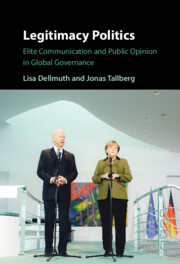Acknowledgments
The inspiration for this book comes from a paradox: While international organizations are increasingly contested among political elites, who challenge and defend these institutions in the public debate, we know little about how such elite communication affects the way ordinary citizens view global governance. Are antiglobalist populists successful in influencing public perceptions of international organizations? To what extent can advocates of global governance push back and secure public support? And what are the logics and circumstances that shape whether citizens are receptive to such messages from political elites?
This book offers our answers to these questions, with a particular focus on how elites influence the popular legitimacy of international organizations. Legitimacy among citizens is a key resource for any political institution, contributing to effectiveness and democracy. Yet earlier research has overlooked how elites shape popular legitimacy perceptions. In this book, we contribute the first comprehensive analysis on this subject. For this purpose, we develop a novel theory of elite communication in global governance and explore empirically how elite messages affect citizen legitimacy beliefs toward international organizations in a broad comparative context.
Looking back to when we started this book project, its subject has only become more topical with time. We began our work on this book before Boris Johnson convinced the British public of the benefits of leaving the European Union, before Donald Trump rolled out an antiglobalist agenda as a United States president, and before liberal leaders rallied behind the World Health Organization in the fight against COVID-19. As we conclude our work, we resist the temptation to call ourselves prescient but admit that slowness in execution sometimes has its advantages. Looking forward, we see no reason why contestation around global governance would not remain a key feature of contemporary politics.
This book extends research that we have previously published in other outlets. Chapter 4 draws in part on an article in the British Journal of Political Science. Chapter 6 builds in part on an article in the Review of International Studies, coauthored with Jan Aart Scholte. We are grateful to Jan for allowing us to use part of our joint work for this chapter. For readers who would like to consult additional analyses we have conducted for the book, a supplementary online appendix, replication data sets, and associated code are available at https://dataverse.harvard.edu/dataverse/legitimacypolitics and on author homepages.
We have been fortunate to benefit from the intellectual generosity of a large number of people in our work on this book. To begin with, we are particularly thankful to our colleagues in the Legitimacy in Global Governance (LegGov) research program for stimulating discussions and constructive feedback throughout the writing of this book: Hans Agné, Bart Bes, Magdalena Bexell, Karin Bäckstrand, Farsan Ghassim, Catia Gregoratti, Kristina Jönsson, Jan Aart Scholte, Thomas Sommerer, Nora Stappert, Fredrik Söderbaum, Anders Uhlin, Soetkin Verhaegen, and Fariborz Zelli. This book complements other research by ourselves and our colleagues on sources, processes, and consequences of legitimacy in global governance.
In addition, we want to extend our gratitude to many other colleagues, who have commented generously on various versions of chapters in this book: Brilé Anderson, Philip Ayoub, Thomas Bernauer, Henning Best, Tobias Böhmelt, Melanie Coni-Zimmer, Klaus Dingwerth, Andreas Dür, Erica Gould, Kristina Jönsson, Aya Kachi, Judith Kelley, Bob Keohane, Mathias Koenig-Archibugi, Tobias Lenz, Björn Ljung, Dan Maliniak, Gary Marks, Christoph Mikulaschek, Naghmeh Nasiritousi, Dan Nielson, Christian Rauh, Jofre Rocabert, Bernd Schlipphak, Henning Schmidtke, Christina Schneider, Duncan Snidal, Theresa Squatrito, Stelios Stavridis, Mike Tierney, Mike Tomz, Felicity Vabulas, Kåre Vernby, Carl Vikberg, Lora Viola, Stefanie Walter, Ogi Zugic, and Michael Zürn. We also extend our thanks to Therese Christoffersson, Elisa Funk, and Ana-Sofia Valderas, who have contributed invaluable research assistance.
In developing our thinking on this topic, we have benefited extensively from feedback at seminars and workshops organized by German Institute for Global and Area Studies Hamburg, Stanford University, Stockholm University, University of Gothenburg, University of Oslo, University of Oxford, University of Zurich, and WZB Berlin Social Science Center, as well as panels held at conferences of the American Political Science Association, European Consortium for Political Research, and International Studies Association. We have also had the good fortune to be part of a stimulating and supportive local environment at Stockholm University, where the research group on global and regional governance deserves special mention. In addition, Jonas would like to thank Stanford University for a rewarding research stay in 2018.
We extend our great gratitude to Riksbankens Jubileumsfond (M15-0048:1) and the Swedish Research Council (2015-00948), whose generous funding has made this book possible.
We are most grateful to executive editor John Haslam and the publishing team at Cambridge University Press for their continuous support and professional handling of the book. Two anonymous reviewers for Cambridge University Press challenged us to further clarify the book’s methodological choices and broader implications for research on contestation in global governance.
Finally, we wish to thank our families for putting up with us as we have worked hard on this book. While we have done our best to keep work and family time separate, we have not always succeeded. Your love and understanding means everything – we dedicate this book to you.

